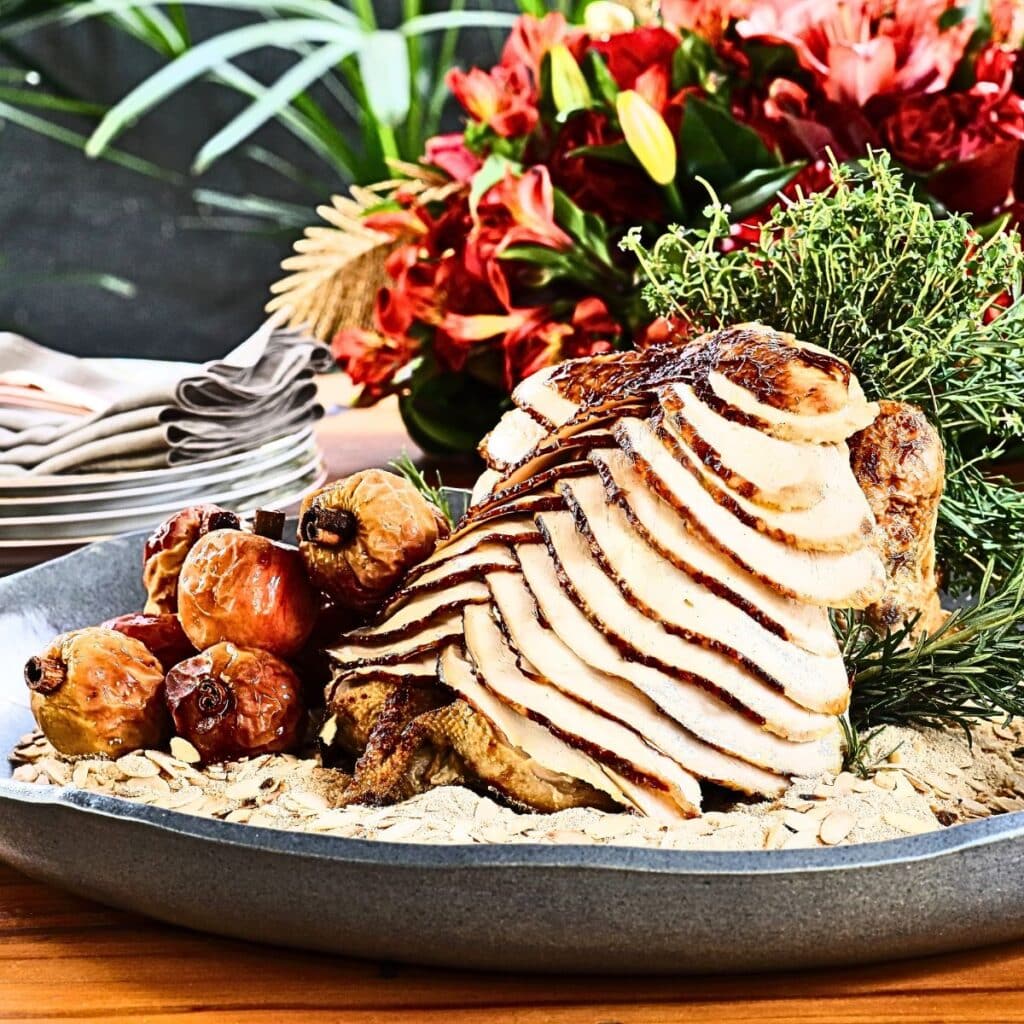Years later, a friend from the U.S. asked why we don’t stuff ourselves with stuffing here—it got me thinking. While Thanksgiving never took root like Carnival or Christmas, its spirit of gratitude isn’t lost on us. Picture a warm November night, families laughing over churrasco instead of turkey, still thankful in their own way. Want to know how this American tradition brushes against Brazil’s vibrant culture? Let’s dig into the story!
Even though Thanksgiving isn’t part of Brazil’s calendar, the idea behind it feels familiar. Gratitude, food, and time spent together are values Brazilians already celebrate — just in different ways and on different dates. That’s why this holiday often sparks curiosity here, even if it never fully became a tradition.
In the United States, it’s one of the most important holidays in American tradition, and Brazilians are used to seeing the Thanksgiving holiday represented in films and series, mainly by the typical dishes of the occasion, big meals: such as bread, mashed potatoes, cookies and, of course, turkey.
Also, if you would like to learn more about life in Brazil, later you can read more in depth about Brazilian lifestyle here. Now, let’s get back into it.
The date has its origins in the 17th century. Historical documents indicate that in 1621, in the town of Plymouth, now Massachusetts, United States (at the time a colony of England), the town governor specified a feast to give thanks (or ‘Thanksgiving’) so, thanksgiving feast God for the bountiful harvest, celebrating a good corn crop after a harsh winter.
First American Thanksgiving (1621): The day of general Thanksgiving has its roots in 1621, when the Pilgrims, a group of English separatists settled in Plymouth, Massachusetts, celebrated a successful harvest.
After a difficult year in which half the settlers died from disease and starvation, the Pilgrims organized a feast, the first time a harvest festival to give thanks for the help of the Wampanoag natives. The native Americans taught them farming and fishing techniques, which were essential for the settlers’ survival.
Celebration: The first feast, which lasted three days, was attended by 53 pilgrims and about 90 Wampanoag natives. The meal included game, fish, and vegetables, and was quite different from modern celebrations.
thanksgiving in brazil
What This Tradition Says
On the day of Thanksgiving, people usually express the reasons why they are grateful during the year. It is an opportunity to reflect on what has passed and to wish for good stuff in the coming new year
Traditional Meal: Families and friends gather for a Thanksgiving dinner, and roast turkey is set as the main course. Other traditional dishes include stuffing, mashed potatoes, cranberry sauce, sweet potatoes, green bean casserole, and various pies, such as pumpkin pie, flaky butter tarts, apple and pecan, and lots of delicious food.
Why Don’t We Celebrate It In Brazil?
The main reason we don’t celebrate Thanksgiving in Brazil is related to its origin. As Brazil was colonized by Portugal and not by England, the cultural and religious influence that gave rise to these thanksgiving traditions did not spread here in the same way.
In Brazil, Thanksgiving Day is not considered a national holiday, and its celebration is generally geared towards English-speaking schools, American companies, and families who follow the Protestant religion. As such, we Brazilians only come into contact with this American holiday through social networks or episodes of American TV series and films.
In recent years, however, Thanksgiving has gained a small symbolic presence in Brazil through social media and global culture. Some Brazilians use the date as a personal moment to reflect, share a meal, or simply say “thank you” — without following the traditional American format. It’s less about the holiday itself and more about the feeling behind it.
thanksgiving in brazil
Similar Celebrations
In my opinion, another celebration in Brazil that bears a certain resemblance to Thanksgiving’s spirit of gratitude and family reunion is Christmas dinner.
- Christmas: celebrates the birth of Jesus Christ on December 25 and is one of the major holidays in Brazil as well as in many other countries. It’s a time to reflect, express gratitude, give thanks, and celebrate as a family.
- Family Reunion: Families get together on Christmas Eve, December 24, for Christmas dinner. It’s an occasion to spend time with loved ones and share special moments.
- Festive supper: Christmas dinner usually includes special dishes and different foods such as Chester, tender, turkey, salpicão, farofa, rice with raisins, rabanada, and various typical desserts. As I see it, this meal is very similar to a Thanksgiving celebration, with an abundant table full of traditional foods.
- Gift Exchange: In addition to the wonderful food, people often exchange gifts, symbolizing the generosity and love between them.
- Reflection and Gratitude: Like me, many people took advantage of the data to reflect on the year that has passed and give thanks for all the victories that have been received. We have masses and services, such as the midnight Mass of the Rooster.
thanksgiving in brazil
Main Similarity
- Spirit of Gratitude: Both celebrations involve the feeling of gratitude at Christmas, for the arrival of Jesus and the victories of the year, and at Thanksgiving, for the good harvest, good luck and the victories received.
- Family Gatherings: Both dates specifically are important times for the family to get together and share a special meal, have good conversations, and create memories.
- Traditional Foods: Just like Thanksgiving, Christmas in Brazil has a variety of typical dishes that make the meal a special moment.
In general, Christmas dinner in Brazil is a celebration that, although its roots are in a different religious context, shares many aspects with Thanksgiving. Both events are marked by gratitude, family togetherness, and a festive meal, making Christmas a significant time of reflection and celebration in Brazil.
thanksgiving in brazil
International comparisons
United States: It’s a national public holiday widely celebrated with large meals, traditional dances, thanksgiving, parades, and sporting events, especially American soccer.
Canadian Thanksgiving: Celebrated on the second Monday of October, Thanksgiving Day in Canada is also marked by family meals and gratitude for the harvest.
Brazil: It’s not a holiday on the official calendar, but it is observed in some communities, especially those with an American or Protestant influence.
thanksgiving in brazil
Happy Thanksgiving!
Thanksgiving may not be a Brazilian holiday, but gratitude is deeply woven into Brazilian culture. We express it through Christmas dinners, family gatherings, and everyday moments around the table. While the traditions differ, the feeling is universal. And in that sense, even without turkey or stuffing, the spirit of Thanksgiving is already present in Brazil — just served our own way.
The history and traditions of the holiday are closely linked to English colonization and historical events in the United States. Brazil, on the other hand, was colonized by Portugal, so there is no similar historical connection that motivates the celebration of this holiday.
Despite this, some communities in Brazil appreciate the date, influenced by American culture, but the celebration remains restricted and is not widely adopted by the entire Brazilian population. So, while Thanksgiving’s spirit of gratitude resonates universally, its traditions and formal recognition remain geared toward Americans.


